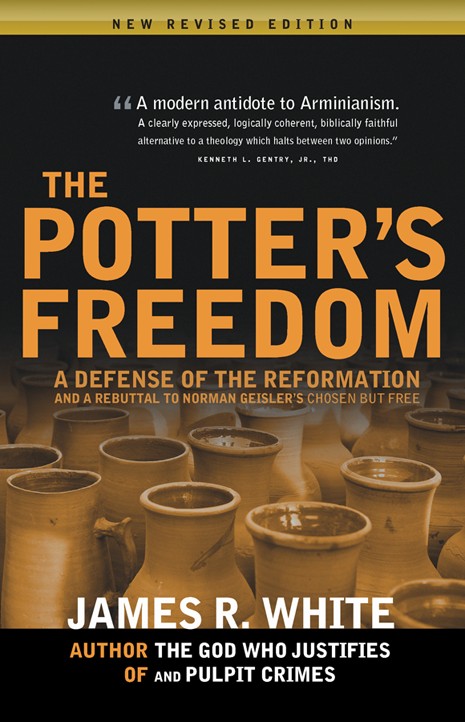The Potter's Freedom: A Defense of the Reformation and the Rebuttal of Norman Geisler's Chosen But Free
a review by Adam Pohlman

Since the beginning of man's existence we have tried to understand the relationship between the responsibility of man and the absolute sovereignty of God. On one hand we understand through Scripture that God is in complete control over every circumstance most notably in the death of Christ for the redemption of a sinful people. On the other hand we also see in the Bible that each person will be held personally responsible for his own actions. Harmonizing the two concepts in the human mind has been a challenge throughout history since right after the time of Christ with Augustine and up to the Reformation with John Calvin developing what today is a debate between Calvinism and Arminianism.
In 1999, Norman Geisler made an attempt to reconcile these challenging truths in his book Chosen But Free. He put forward his understanding of God's sovereignty in what he labeled "moderate Calvinism." A year later, James White responded to Geisler's book with The Potter's Freedom: A Defense of the Reformation and the Rebuttal of Norman Geisler's Chosen But Free. White, and many who hold to Reformed theology, felt that Geisler misrepresented the Reformed viewpoint, thereby making it look foolish in order to make Geisler's view appear to be more generous. White says Chosen But Free presents itself as "moderate Calvinism" but actually expresses itself as an Arminian attack on Reformed doctrine (pg. 336).
The Potter's Freedom is very well written and easy to follow for casual readers. While discussing a very in-depth theological topic, it is written in a way that is simple to follow, especially if the reader keeps a Bible open along side. The chapters are organized to discuss four of the five points of Calvinism (Total Depravity, Unconditional Election, Particular Redemption, and Irresistible Grace) and compare the viewpoints of Geisler's and White's in light of the verses that both men address. One chapter explains the Reformed view of the doctrine, then the following chapter answers the objections and questions many have with Calvinism. White does this with great detail in examining the debated verses by explaining the context and the meaning of the words in question. All of this detail is very understandable and helpful to most readers.
James White begins The Potter's Freedom with an explanation of what he believes is the "vital issue"; who is the only being in the universe that is truly "free"? We like to believe that we have a "free will," but White says God is the only one who is totally free to choose as he pleases. "God is the absolutely free Creator, the Potter, who has complete sovereignty over the pots, humans, who, as fallen creatures, find their wills enslaved to sin, in bondage and unable to 'cooperate' with any offered grace." (pg. 36).
What does this matter to the Christian? Why should we care about such theological discussions? White says, "The Potter's freedom is precious to the Christian, for it is the very basis of salvation itself. Our sovereign Creator is free to be the good, holy, merciful, loving God that He is." (pg. 337) It is comforting to us to know that despite the wretchedness of our evil hearts which were at enmity with God, He freely chose to lavish us with goodness anyway. And since He changed our hearts from God-hating to God-loving we can be confident that it is His power that will keep us to the end and through eternity, where nobody can boast that the strength of their own faith is what saved them, but the absolutely free choice of a loving God who gave us what we did not deserve through the substitution of His Son paying our death penalty.